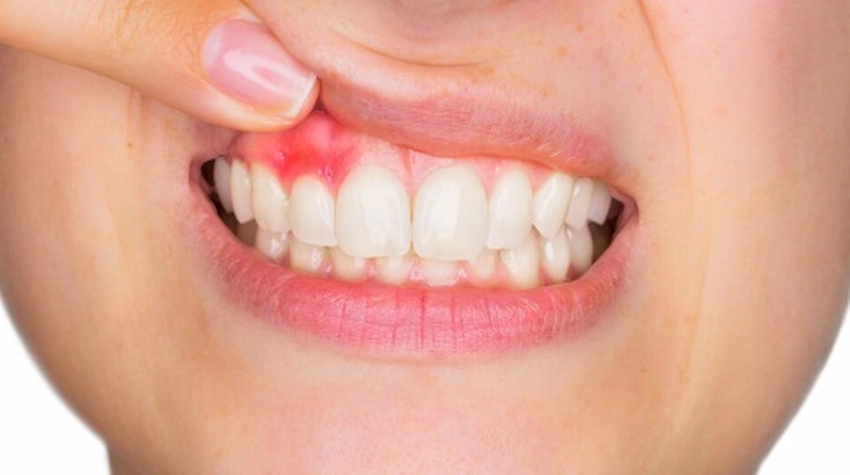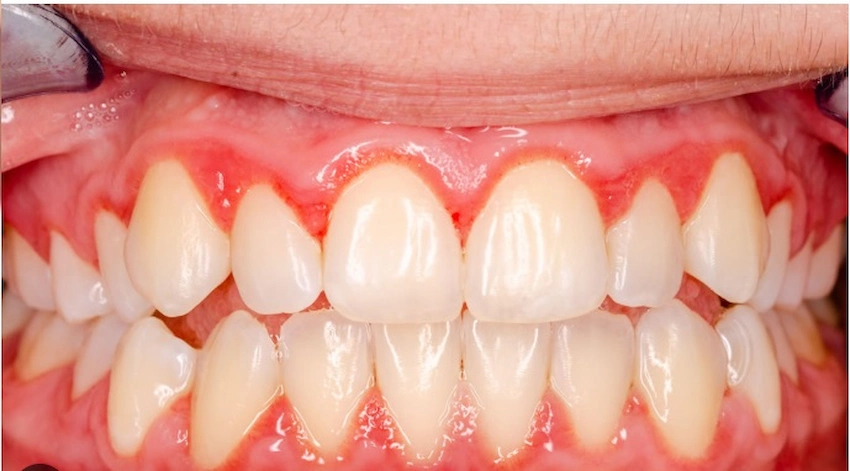🦷Gum Inflammation: Causes And Remedies

Gum inflammation this disease may have a local or systemic origin and can be a result of inadequate oral hygiene or the existence of various other diseases. Also, you will find the top root causes of gum disease and the symptoms of it and the necessary steps you should follow to protect your gums’ health and if your gums become worse, recover them here.
Causes of Gum Inflammation
Gum inflammation, also known as gingivitis, generally happens when bacteria on the teeth form a layer of plaque. The jet-black layer of bacteria that sticks to and covers your teeth is what we call plaque, and it is what is behind the swelling of the gums. Other sources that contribute to the inflammation of the gums are poor oral hygiene practices: as the plaque builds up, it turns to tartar slowly and that is the bes
Besides, nutrient defects, especially the lack of vitamin C, can be a high potential of immune system compromise, thus reducing the ability of the body to resist infections.
Moreover, certain factors s, such as smoking and tobacco use, restrict the flow of blood to the gums, cause a dry mouth and thus damage the roots. In addition, some medical conditions like diabetes and hormonal changes during pregnancy are other ways to get gum inflammation. Among the causes of gum disease, stress and genetics are sometimes referred to as aggravating factors.
Symptoms of Gum Inflammation

Identifying gum inflammation early can prevent more serious dental issues. Common symptoms include red, swollen, or puffy gums, bleeding when brushing or flossing, changes in the position of teeth, and more. The sooner you identify your symptoms and develop strategies to improve your gum health, the lesser chances there are of developing serious complications.
It is part of being responsible and doing your best not just with your health but with how you are treating those around you as well as yourself. People already afflicted by symptoms should first schedule a visit to the dentist so that proper attention can be put on keeping them clean before they come back into normal condition.
- Red, swollen, or puffy gums
- Bleeding while brushing or flossing
- Loose or shifting teeth
- Persistent bad breath
- Pockets forming between your gums and teeth
Gum inflammation is a dedicated issue that permeates millions of lives and remains ignored by millions throughout the world. It is, however, manageable and insignificant if addressed promptly and effectively. Understanding the causes of gum inflammation, symptoms, and early-stage treatment options, you can take the necessary steps to protect and enhance your gum health and wellbeing. Regular dental care, proper oral hygiene habits,
If bleeding gums are noted during brushing and/or during the use of dental floss. Having persistent halitosis, popularly known as bad breath or a foul taste and scent in the mouth.If receding gums are noticed; a condition that may cause the teeth in your mouth to look longer than usual.
Gum sensitivity or soreness when eating or having drinks. When pus and other secretions appear between the gums and teeth. If you exhibit any of the symptoms or signs mentioned above or against the symptoms mentioned above, consulting a dental expert or a licensed practitioner is highly recommended to provide you with dental assistance whenever the need arises, to help maintain improved knowledge, and follow the right practices that will help ensure proper and healthy dental care.
Effects of Untreated Gum Inflammation
Gum inflammation also known as Gingivitis and it can lead to several serious health issues if not treated on time. Inflammation can escalate into more severe forms of gum disease damaging the soft tissue around teeth and possibly causing tooth loss. In addition to this untreated gum inflammation can cause systemic health problems as bacteria can travel from the gums into the bloodstream.
Progression to Periodontitis
Gingivitis can develop into periodontitis in which the gums and even the bones supporting the teeth are also affected. The periodontitis causes wear down and loss of the supporting tissues thus developing deep pockets that are difficult to clean. If gingivitis is not treated it can become so severe to an extent that is irreversible thereby leading to the loss of different teeth.
Tooth Loss
Severe gum inflammation disease can destroy the supporting structure of the teeth, debasing the tooth and leading to loss of the teeth entirely. When advanced periodontitis occurs the connective tissue and bone may be lost due to the action of the bacteria present in the gums. Tooth loss has serious effects on the ability of a person to eat, the way they speak, and their overall mental health since teeth give structure to the face.
Increased Risk of Heart Disease
Chronic inflammation of the gum inflammation and periodontal disease have been associated with an increased risk of heart disease because bacteria from the mouth can get into the bloodstream. The bacteria can cause inflammation and the development of clots that can clog arteries hence raising the chances of heart disease or stroke. Although further research to establish the association between the two diseases is ongoing, people are encouraged to take care of their gums to avoid problems of the heart.
Diabetes Complications
Diabetic people have many opportunities for developing gum inflammation when their blood sugar levels are raised. The mouth is becoming drier as sugar levels increase in the body, which in turn promotes the growth of bacteria causing inflammation and other gum diseases. This is a vicious cycle because without the control of blood sugar, the body will generate more stress hormones only to exacerbate gum disease. In a word, diabetics have to stick to hygiene rules for their oral cavity and get rid of gum disease so as not to complicate their health circumstances.
Prevention Tips for Gum Inflammation
It is vital for people to follow appropriate preventive and oral care measures to prevent gum inflammation. Making those good and necessary dental hygiene habits and lifestyle changes can reduce the risk of developing gum inflammation to a great extent hence helping people get a gorgeous smile and keep their mouth and gums healthy. The following are the things you can do to ensure that your gums and mouth are healthy for as long as possible:
Brush twice daily flossing on a daily basis can ultimately become a simple and effective mode of personal oral care regimen since it is able to eradicate food substances and plaque materials that gather along the spaces between teeth and in the below gum line, this process helps in diminishing an inflammatory response of the gums.
A visit to the dentist for check-ups should be frequent at least after every six months to enable the dentist carry out thorough cleaning of teeth and also classifying problems if any at a very early stage.The period should give them enough chances for oral health care that includes teeth prevention teeth cleaning and removal of irremovable or stubborn stains that build on the teeth and may not be removed by normal brushing of the teeth.
With proper nutrition for the gums, it could help improve and maintain gum health; feeding practice should be nutrient-rich countries and minerals, especially vitamin C which help in keeping the gums firm and healthy. In this regard, consumption of such food items like oranges,
Home Remedies for Gum Inflammation

Gum disease, also known as periodontitis or gum inflammation can cause an array of issues for any sufferer, including issues like pain, swelling pain and bleeding, which affects how you chew and speak and could give you bad breath, among others. But you may not have much of a problem to deal with anymore if you know the right home remedies that can help you to relieve the discomforting symptoms that arise in case of this condition and give your gums the needed healing.
This treatment is very easy and can be achieved by many persons; to achieve this, you should consider continuing to rinse your mouth with warm salt water as this simple solution can reduce swelling and kill bacteria. Furthermore, in order to provide relief from the pain and also reduce the swelling, you can use a cold compress on the surface of your cheek. You can soothe the unpleasant swelling that was experienced in the form of chamomile tea and also, the effectiveness of aloe vera gel is also very efficient.
These can be used as mouth rinses or applications directly to your gums. To avoid further irritation and to promote healing keep up with an excellent oral cavity, this may involve for example brushing the teeth, soft-bristled toothbrush is gentle, and anyone must floss daily any time HR is recommended.
Professional Treatments for Gum Inflammation
If you have tried all the above-mentioned home remedies, yet they haven’t worked and you still have gum inflammation, it is important to visit a dentist for specialized care. You should not struggle with gum disease thinking that it is customary when your dentist can help you to improve the situation for a few days. This can help to diagnose the problem and advise the proper course of treatment. Some of the professional treatments that dentists recommend to reduce inflammation and cure gum disease are as follows:
- Deep Cleaning: In cases where the situation in the area below the gum line might be very serious, their dentist might have to perform scaling and root planing in order to remove the bacteria houses or plaque and tartar deposit bacteria along the gum line, and heal the tissues underneath.
- Medications: If scaling and root planing do not treat the infection adequately, dentists may recommend use of topical antibiotics and or antimicrobial mouth rinses as these can help to reduce infection and inflammation in the gum area which can aid the healing process.
- Laser Therapy: If you want the latest procedure, you are likely to be subjected to laser therapy which uses lasers to eliminate the inflamed gum tissue without harming the surrounding tissue, it is also a one of a kind procedure since it is bloodless and has short recovery times so for people who are afraid or do not want invasive procedures they have a quick solution.
Frequently Asked Questions About Gum Inflammation
Gum inflammation, or gingivitis, is primarily caused by poor oral hygiene, which leads to plaque buildup on teeth. Other factors include smoking, hormonal changes, certain medications, and underlying health conditions like diabetes.
Symptoms of gum inflammation include red, swollen gums, bleeding when brushing or flossing, and persistent bad breath. Some individuals may also experience gum recession or loose teeth due to advanced gum disease.
Preventing gum inflammation requires regular brushing and flossing, using mouthwash to kill bacteria, and attending routine dental check-ups. Avoiding tobacco products and reducing sugary foods can also help maintain gum health.
Yes, if caught early, gum inflammation can be reversed with proper oral hygiene. Regular brushing, flossing, and professional cleanings can remove plaque and bacteria, allowing gums to heal and return to a healthy state.
If left untreated, gum inflammation can progress to periodontitis, a more serious form of gum disease that can cause tooth loss and impact overall health. Early intervention is key to preventing complications.
Untreated gum inflammation can increase the risk of systemic health problems such as heart disease, diabetes complications, and respiratory issues. The bacteria from the gums can enter the bloodstream and cause inflammation in other parts of the body.
Home remedies for gum inflammation include rinsing with warm salt water, using a cold compress, and applying aloe vera gel to soothe irritated gums. Maintaining good oral hygiene is essential to reduce symptoms and promote healing.
If gum inflammation persists despite home care, or if you experience severe symptoms such as persistent bleeding, swelling, or pain, it’s important to consult with a dentist. Professional treatment, such as deep cleaning or medication, may be required.
Dentists may treat gum inflammation with scaling and root planing, which involves cleaning below the gum line. In more severe cases, antibiotics, antimicrobial mouth rinses, or laser therapy may be used to reduce infection and promote healing.
Yes, if gum inflammation progresses to periodontitis, it can lead to tooth loss due to damage to the supporting structures of the teeth. Early treatment is essential to prevent tooth loss and other complications associated with advanced gum disease.




